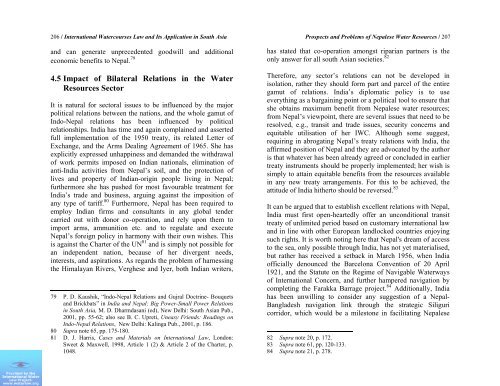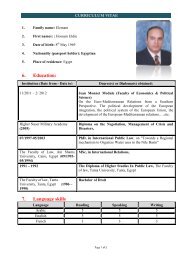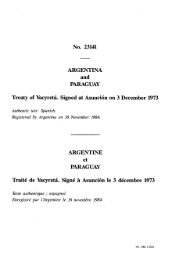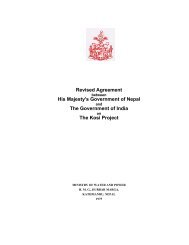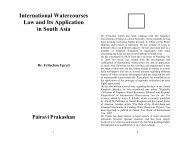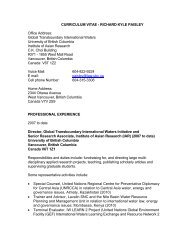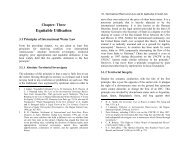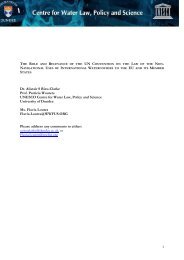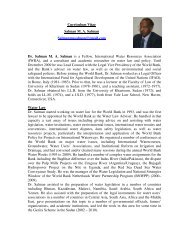Upreti, Trilochan, International Watercourses Law and Its Application ...
Upreti, Trilochan, International Watercourses Law and Its Application ...
Upreti, Trilochan, International Watercourses Law and Its Application ...
Create successful ePaper yourself
Turn your PDF publications into a flip-book with our unique Google optimized e-Paper software.
206 / <strong>International</strong> <strong>Watercourses</strong> <strong>Law</strong> <strong>and</strong> <strong>Its</strong> <strong>Application</strong> in South Asia Prospects <strong>and</strong> Problems of Nepalese Water Resources / 207<strong>and</strong> can generate unprecedented goodwill <strong>and</strong> additionaleconomic benefits to Nepal. 794.5 Impact of Bilateral Relations in the WaterResources SectorIt is natural for sectoral issues to be influenced by the majorpolitical relations between the nations, <strong>and</strong> the whole gamut ofIndo-Nepal relations has been influenced by politicalrelationships. India has time <strong>and</strong> again complained <strong>and</strong> assertedfull implementation of the 1950 treaty, its related Letter ofExchange, <strong>and</strong> the Arms Dealing Agreement of 1965. She hasexplicitly expressed unhappiness <strong>and</strong> dem<strong>and</strong>ed the withdrawalof work permits imposed on Indian nationals, elimination ofanti-India activities from Nepal’s soil, <strong>and</strong> the protection oflives <strong>and</strong> property of Indian-origin people living in Nepal;furthermore she has pushed for most favourable treatment forIndia’s trade <strong>and</strong> business, arguing against the imposition ofany type of tariff. 80 Furthermore, Nepal has been required toemploy Indian firms <strong>and</strong> consultants in any global tendercarried out with donor co-operation, <strong>and</strong> rely upon them toimport arms, ammunition etc. <strong>and</strong> to regulate <strong>and</strong> executeNepal’s foreign policy in harmony with their own wishes. Thisis against the Charter of the UN 81 <strong>and</strong> is simply not possible foran independent nation, because of her divergent needs,interests, <strong>and</strong> aspirations. As regards the problem of harnessingthe Himalayan Rivers, Verghese <strong>and</strong> Iyer, both Indian writers,79 P. D. Kaushik, “Indo-Nepal Relations <strong>and</strong> Gujral Doctrine- Bouquets<strong>and</strong> Brickbats” in India <strong>and</strong> Nepal: Big Power-Small Power Relationsin South Asia, M. D. Dharmdasani (ed), New Delhi: South Asian Pub.,2001, pp. 55-62; also see B. C. <strong>Upreti</strong>, Uneasy Friends: Readings onIndo-Nepal Relations, New Delhi: Kalinga Pub., 2001, p. 186.80 Supra note 65, pp. 175-180.81 D. J. Harris, Cases <strong>and</strong> Materials on <strong>International</strong> <strong>Law</strong>, London:Sweet & Maxwell, 1998, Article 1 (2) & Article 2 of the Charter, p.1048.has stated that co-operation amongst riparian partners is theonly answer for all south Asian societies. 82Therefore, any sector’s relations can not be developed inisolation, rather they should form part <strong>and</strong> parcel of the entiregamut of relations. India’s diplomatic policy is to useeverything as a bargaining point or a political tool to ensure thatshe obtains maximum benefit from Nepalese water resources;from Nepal’s viewpoint, there are several issues that need to beresolved, e.g., transit <strong>and</strong> trade issues, security concerns <strong>and</strong>equitable utilisation of her IWC. Although some suggest,requiring in abrogating Nepal’s treaty relations with India, theaffirmed position of Nepal <strong>and</strong> they are advocated by the authoris that whatever has been already agreed or concluded in earliertreaty instruments should be properly implemented; her wish issimply to attain equitable benefits from the resources availablein any new treaty arrangements. For this to be achieved, theattitude of India hitherto should be reversed. 83It can be argued that to establish excellent relations with Nepal,India must first open-heartedly offer an unconditional transittreaty of unlimited period based on customary international law<strong>and</strong> in line with other European l<strong>and</strong>locked countries enjoyingsuch rights. It is worth noting here that Nepal's dream of accessto the sea, only possible through India, has not yet materialised,but rather has received a setback in March 1956, when Indiaofficially denounced the Barcelona Convention of 20 April1921, <strong>and</strong> the Statute on the Regime of Navigable Waterwaysof <strong>International</strong> Concern, <strong>and</strong> further hampered navigation bycompleting the Farakka Barrage project. 84 Additionally, Indiahas been unwilling to consider any suggestion of a Nepal-Bangladesh navigation link through the strategic Siliguricorridor, which would be a milestone in facilitating Nepalese82 Supra note 20, p. 172.83 Supra note 61, pp. 120-133.84 Supra note 21, p. 278.


